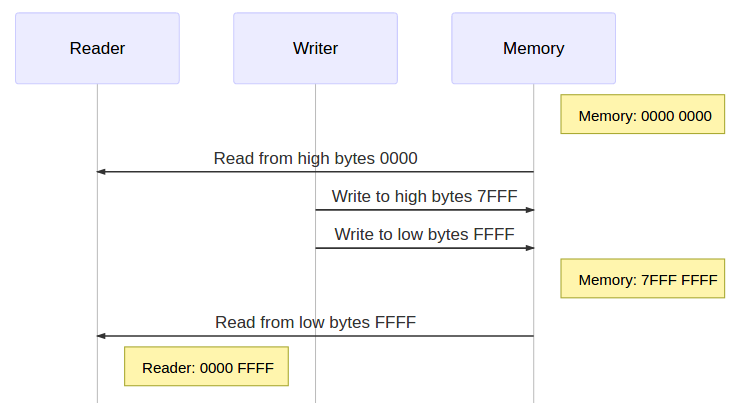C++11 data race
Data races in C++11 are undefined behaviour
Introduction
Without appropriate synchronization, access to the same data from multiple threads, with at least of one of them writing (data races), is undefined.
The C++11 standard provides support for multi-threading, the description of an abstract machine with a memory model. When synchronization is not used, the compiler is allowed a lot of freedom, in a way similar to the DEC Alpha CPUs.
Undefined is a C++ standard legalese term. For a particular compiled binary and a particular processor, one could theoretically figure out what could happen. But just because it seems to work, it does not mean that it really works and it’s not just a bug waiting to happen.
Multiple writes
One invalid line of defence is the claim “it’s fine because I’m writing a 32 bit integer, and my processor writes it atomically”. This refers to the problem where to write a variable, the processor performs two distinct operations to write the high and low part, and a different thread could read a old half and a new half leading to a value that’s neither old or new.

This could be a problem, but avoiding it is not sufficient. Here are two examples.
Integer data race
1
2
3
4
5
6
7
8
9
10
11
// Given two `int` variables `x` and `y` set initially to `0`:
// Thread 1:
if (x != 0) {
++y;
}
// Thread 2:
if (y != 0) {
++x;
}
The compiler could assume that the if statements are rarely taken, so it
would be more optimal to increment the variables first and then decrement them
if the condition was not met. It is then allowed to generate code equivalent to
the following:
1
2
3
4
5
6
7
8
9
10
11
// Thread 1:
++y;
if (x == 0) {
--y;
}
// Thread 2:
++x;
if (y == 0) {
--x;
}
Boolean data race
Another example is:
1
2
3
4
5
6
7
8
9
// given a `bool` variable set initially to `false`
// Thread 1:
while (!stop) {
// do work
}
// Thread 2:
stop = true;
The compiler can decide to test only once early for the stop variable if it’s
value is never changed in the while loop and generate code equivalent to:
1
2
3
4
5
6
7
8
9
// Thread 1:
if (!stop) {
while (true) {
// do work
}
}
// Thread 2:
stop = true;
Conclusion
If more than one thread access the same variable/memory location with no appropriate synchronization: it’s a bug.
References
- Hans-J. Boehm: Threads Cannot be Implemented as a Library, 12 Nov 2004